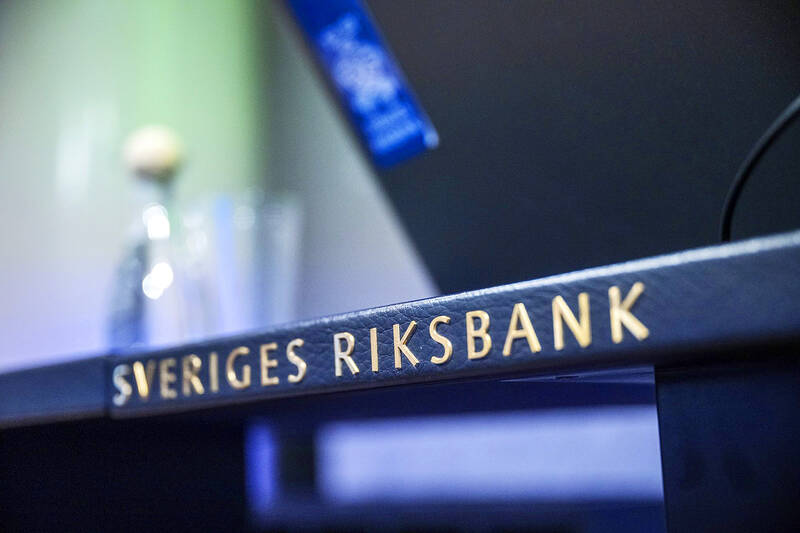The Riksbank raised its interest rate by a full percentage point in its most aggressive tightening of almost three decades of inflation targeting, starting a global round of monetary policy action to bring prices under control.
The Swedish central bank lifted its policy rate to 1.75 percent, defying the forecasts of most economists for a smaller move as officials escalated their response to price increases that have exceeded their forecasts for 11 straight months.
“The risk is still large that inflation becomes entrenched and it is extremely important that monetary policy acts to ensure that inflation falls back and stabilizes,” officials said in a statement in Stockholm.

Photo: Bloomberg
“Monetary policy now needs to act more than was anticipated in June,” they said.
By this time next year, the rate is likely to have reached 2.5 percent, which implies another 0.75 percentage points in tightening, their new forecasts showed.
The outsized move places the Riksbank alongside the Bank of Canada as the only two central banks overseeing the world’s 10 most-traded currencies to have hiked by such an amount this year.
The decision is a prelude to the highlight of the week, when US Federal Reserve policymakers are predicted to stick with a 75 basis point increase amid some investor speculation that they could go for a bigger increment as the Swedes have done.
Other counterparts also anticipated to hike rates this week include the Bank of England, the Swiss National Bank and Norway’s central bank, all of which are expected to keep up or even intensify the aggression of their policy stances.
Swedish inflation last month reached another three-decade high at 9 percent, highlighting how policymakers had underestimated price increases after what was long one of the most stimulus-friendly approaches in the rich world.
As it seeks to catch up, the Riksbank is facing a dilemma familiar to its global peers of how to dampen inflation without too much harm to the economy. That is especially acute in Sweden, where household indebtedness is high and more than 40 percent of outstanding mortgages feature rates that are set for periods of no more than three months.
The increase in borrowing costs has so far led to an 8 percent decline in house prices from a peak earlier this year, and a simultaneous run-up in energy and mortgage costs could lead to an accelerated slump.
The Riksbank cut all its growth forecasts and now expects the Swedish economy to contract 0.7 percent next year instead of expanding by that amount.
“It would be even more painful for the Swedish economy if inflation were to remain at the current high levels,” officials said. “By raising the policy rate more now, the risk of high inflation in the longer term is reduced and thereby the need for an even greater monetary tightening further ahead.”

UNCERTAINTY: Innolux activated a stringent supply chain management mechanism, as it did during the COVID-19 pandemic, to ensure optimal inventory levels for customers Flat-panel display makers AUO Corp (友達) and Innolux Corp (群創) yesterday said that about 12 to 20 percent of their display business is at risk of potential US tariffs and that they would relocate production or shipment destinations to mitigate the levies’ effects. US tariffs would have a direct impact of US$200 million on AUO’s revenue, company chairman Paul Peng (彭雙浪) told reporters on the sidelines of the Touch Taiwan trade show in Taipei yesterday. That would make up about 12 percent of the company’s overall revenue. To cope with the tariff uncertainty, AUO plans to allocate its production to manufacturing facilities in

Taiwan will prioritize the development of silicon photonics by taking advantage of its strength in the semiconductor industry to build another shield to protect the local economy, National Development Council (NDC) Minister Paul Liu (劉鏡清) said yesterday. Speaking at a meeting of the legislature’s Economics Committee, Liu said Taiwan already has the artificial intelligence (AI) industry as a shield, after the semiconductor industry, to safeguard the country, and is looking at new unique fields to build more economic shields. While Taiwan will further strengthen its existing shields, over the longer term, the country is determined to focus on such potential segments as

Chizuko Kimura has become the first female sushi chef in the world to win a Michelin star, fulfilling a promise she made to her dying husband to continue his legacy. The 54-year-old Japanese chef regained the Michelin star her late husband, Shunei Kimura, won three years ago for their Sushi Shunei restaurant in Paris. For Shunei Kimura, the star was a dream come true. However, the joy was short-lived. He died from cancer just three months later in June 2022. He was 65. The following year, the restaurant in the heart of Montmartre lost its star rating. Chizuko Kimura insisted that the new star is still down

While China’s leaders use their economic and political might to fight US President Donald Trump’s trade war “to the end,” its army of social media soldiers are embarking on a more humorous campaign online. Trump’s tariff blitz has seen Washington and Beijing impose eye-watering duties on imports from the other, fanning a standoff between the economic superpowers that has sparked global recession fears and sent markets into a tailspin. Trump says his policy is a response to years of being “ripped off” by other countries and aims to bring manufacturing to the US, forcing companies to employ US workers. However, China’s online warriors